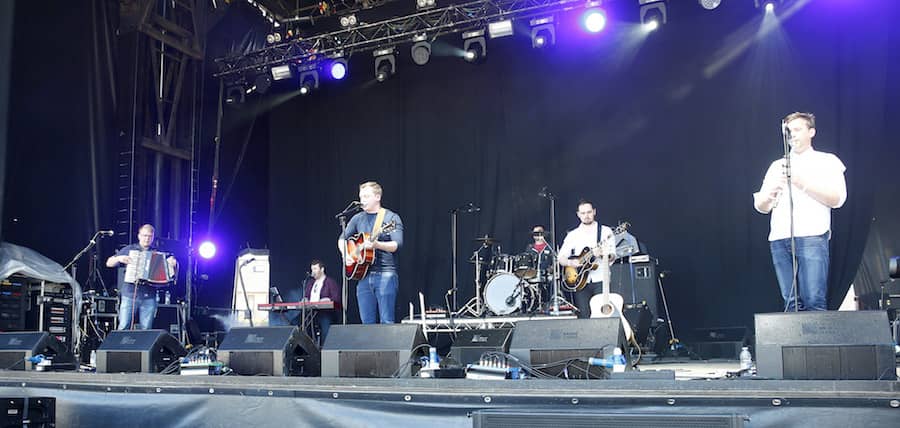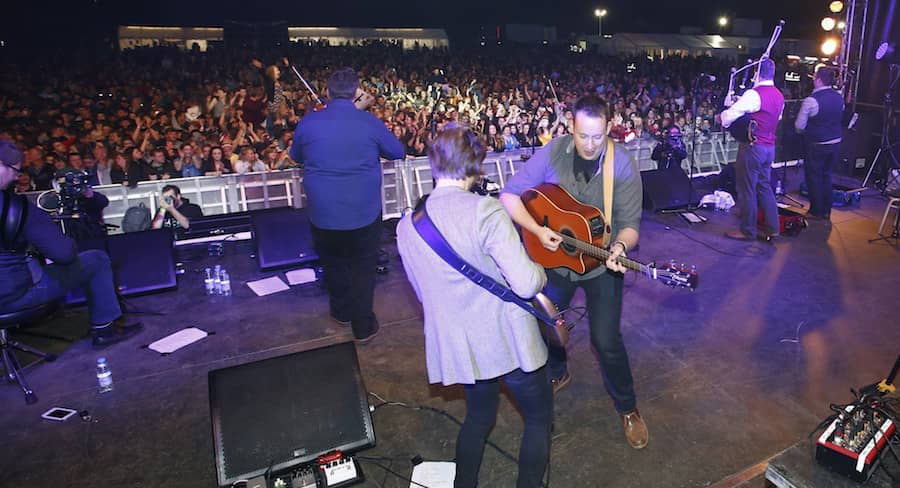I’ve written before about the seemingly inexhaustible supply of excellent musicians emerging from the West Highlands and the Western Isles over recent years, most recently when reviewing the latest Skipinnish album, The Seventh Wave. Oban Live, in part, is a two-day gathering of some of the best. This year, as well as Skipinnish, it featured sets from Tide Lines, Trail West and, inevitably, the band whose tenth birthday concert in 2015 sowed the seeds that have grown into Oban Live, Skerryvore (main image).
But before any of these bands took to the stage, Oban Live 2017 opened with a set from young, local musicians that underlined just how deeply traditional ceilidh music is entrenched in Argyll life. Fèis Latharna exists to provide opportunities for young people in the Oban and Lorn area to receive tuition in a wide range of the Gaelic arts – song, dance, drama and traditional music. In 2010 the Fèis instigated a summer project, The Argyll Ceilidh Trail. Students from the classes auditioned to be part of a band that would tour Argyll for two weeks playing ceilidhs in village halls and the occasional pub, giving the youngsters a taste of life as professional musicians. Some members of that first Ceilidh Trail are still playing together as Ceol an Aire, and for Oban Live they were joined by the teenagers who played the 2016 Trail. The combined band set the tone for the rest of the weekend encouraging audience dancing right from the opening set of reels. Meanwhile, seven more talented youngsters are working up for the start of the 2017 Trail at Inveraray in mid-July.
The continuing popularity of village hall ceilidhs in these parts of Scotland, social events that can involve all strands within the community, certainly encourages the healthy supply of young traditional musicians. But, as I was told on my first visit to Tiree, so does peer pressure, the cool kids are the ones in the music tuition classes. Not everyone involved in the ceilidh scene necessarily embraces all aspects of the underlying Gaelic culture, but the connection endures thanks to the traditional music that’s at the core of both and encourages the survival of both.
So, it’s no surprise the four bands named at the start of this piece all have their origins firmly rooted in this ceilidh band tradition. But as I listened and danced (well, as close to dancing as I can manage) to them over the weekend it was fascinating to see how each band has forged its own path.
First up, following on from Ceol an Aire, were Trail West (image above), a band I heard within an hour of my first arrival on Tiree. Breakfast in a café, as soon as it opened on a grey, misty morning, was cheered enormously by the CD they were playing. The waitresses were super keen to tell me about the lads from Tiree and South Uist who’d recorded the album and were THE ceilidh band of the moment. Fast forward to last year, Trail West released their second album, and Neil McFadyen concluded his Folk Radio review with “I don’t think any other band has achieved such a convincing and honest adaptation of ceilidh music. Their versatility shines through in the studio, but their hearts are on the dance floor – and it feels like their natural home.” On to 2017 and Oban Live provided just the right audience for Trail West to prove him right. The four core members of the band, Ian Smith (accordion), Seonaidh MacIntyre (small pipes, bagpipes and whistles), Andrew Findlater (drums, vocals) and Alain Campbell (guitar, bagpipes) were joined by Jonathan Gillespie on keyboards and vocals and Allan Nairn on electric guitar. Ian explained to me they intended to use this line up at a number of larger gigs this summer, aiming for Trail West to become recognised as a festival band as well as a ceilidh band. On the basis of the excellent set they produced at Oban, this shouldn’t take long.
I asked Ian for his assessment of the current state of the West Highlands and Island scene,
“It’s very healthy just now. To get such a big crowd attending an event where traditional music is the main genre shows how popular the music is with both young and old. The amount of youngsters coming through the ranks (and even overtaking a lot of us who have been playing for years) is heartening and I believe the future of traditional music in the West Coast is very bright, especially if we can maintain the popularity of the genre within the younger listeners.”
The level of community support for the music and Trail West, in particular, was wonderfully illustrated in 2015 when the band’s van was stolen in Glasgow. A crowd funding page set up on their behalf to enable them to replace instruments raised more than double the target of £5000 on the day it was launched.
Trail West’s periodic expansion into a six-piece outfit in the quest to play larger festival venues inevitably goes hand in hand with a desire to expand the music’s popularity beyond its home ground. In this, they are certainly not alone, and Skipinnish (image above) took a major step last year when they played Shrewsbury Festival. Their set went down so well they’ve been asked back this year. I asked Angus MacPhail and Norrie McIver about how the Shrewsbury audience had taken to them.
Angus: “The most amazing crowd and one of the most amazing things about it, we’re used to, on the West Coast especially, a lot of the crowd singing our songs, and it was very unusual to hear all these songs about Tiree and Lewis sung in a Shrewsbury accent”.
Norrie added…
“The brilliant part of it was, we did two gigs and at the first one, when we did Walking on the Waves, normally when we do the first chorus, the audience erupts and sings, but this was a bit different no one really knew it. But between the two gigs, people bought CDs, by the second gig everyone was singing along.”
Having conquered Shrewsbury, Skipinnish are continuing to set their sights further afield, the morning after their Oban set they were off to Germany. It came as a surprise, then, when Norrie remarked…
“We’ve had a great month launching the album (The Seventh Wave), sell out gigs all over, especially the East Coast, the band’s not used to playing the East Coast.”
Yes, he did mean the east coast of Scotland, not the USA. So, it would seem few places are immune to the West Coast sound, but many are still to experience it. The bands could have a lot more travelling ahead of them. Which is rather ironic as one of the reasons Norrie McIver gave for leaving Mànran at the end of 2015 was to reduce the time he was spending away from home.
Last year, two original members of Skipinnish, Robert Robertson (image above) and Ross Wilson left, forming a new four-piece outfit, Tide Lines. They too have just recorded an album, Dreams We Never Lost, and Oban Live was its launch gig. Their primary instrumentation is electric and acoustic guitars, keyboards and drums and so their sound tends to be rather less traditional. However, Alasdair Turner can happily exchange his electric guitar for Highland pipes and bring the sound closer to the traditional music of the West Highlands and Islands, music they continue to hold up as their major influence. They’ve also brought some songs with them from Skipinnish, songs that Robert co-wrote with Angus MacPhail, most notably Walking on the Waves. Hearing this song twice, first from Skipinnish and the following day from Tide Lines was certainly a pointer to the fresh, less traditional, direction in which Tide Lines are heading. The Oban audience, though, gave both bands an ecstatic reception, and the demand for Tide Lines at the signing tent was by far the greatest of the weekend.
Given their current standing as international ambassadors for Celtic folk-rock, it’s easy to overlook Skerryvore’s origins as a ceilidh band. But that is certainly how I first came across them, playing a private function for a company I was working with in Glasgow. Over the years since, they’ve been careful to keep classic, danceable tunes in their sets while expanding the musical palette. Adding Alan Scobie’s keyboards, Alec Dalglish using his Telecaster as much as his acoustic guitar and letting his song writing talents flourish. As their repertoire expanded, they could rely on accordion, pipes and whistles from the Gillespie brothers and Craig Espie’s ever lively fiddle to keep the music firmly connected to its traditional roots. It’s this finely balanced mix, neither the folk nor the rock ever threatening to overwhelm the other that has propelled them to a string of awards at home and established their international reputation.
It was a given that by the time Skerryvore took to the stage to close out Oban Live 2017, the crowd would be pumped up in anticipation of their local favourites. Experienced, as they are now, in engaging with far larger crowds on regular US tours, it was nevertheless clear from their stage chat that having so many gathered on home turf marked this out as a special gig. They then delivered a set that started strong and kept on growing. There was one person on stage, though, for whom all this wasn’t routine. For new member, piper Scott Wood, it was the biggest gig he’d played since joining and afterwards he readily admitted to pre-gig nerves. Not that there was any sign of them on stage as both his piping and whistle playing fitted smoothly into the Skerryvore mould. Post-gig he could happily have been bouncing off the walls of the green room, if only it hadn’t been a tent. Scott joined the band when Martin Gillespie was forced to take a step back from full-time piping, suffering from focal hand dystonia. At the time, Martin promised he’d be present at all the gigs, playing when he could. Probably the biggest roar of the weekend came when he walked on stage for a piping duet with Scott and stayed to add his whistle playing to the mix.
Oban Live this year continued where it left off in 2016, bringing first class music to a West Coast location that shows an unparalleled enthusiasm for both the traditional and the commercial. The latter represented this year by Toploader and Hue and Cry. But, for me, it’s selling point is the showcase it provides for local talent, some that’s moved on to national and international prominence, others still to be discovered outside of their home turf. Visits to this part of Scotland show time and again that the area is a seed bed for nurturing these talented musicians, long may it continue.



